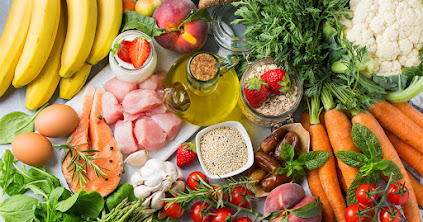Nourishing Defense: Exploring the Vital Role of Nutrition in Cancer Prevention
Introduction
In the pursuit of a healthier lifestyle,
understanding the significant impact of nutrition on
cancer prevention is paramount. Research shows that our dietary
choices play a pivotal role in influencing the development of certain cancers.
This blog delves into the intricate connection between diet and cancer risk,
shedding light on foods and dietary patterns that may empower you to reduce
your risk and foster a life of wellness.
Part 1: Unraveling the Diet-Cancer
Link
The Science behind It:
• Explore how certain dietary components
can affect DNA integrity, inflammation, and oxidative stress, contributing to
cancer development.
• Understand the concept of carcinogens
and their interactions with our bodies.
Foods to Approach with Caution:
• Identify foods high in processed
sugars, saturated fats, and preservatives that are linked to an increased
cancer risk.
• Consider the importance of moderation
and mindful consumption.
Part 2: Empowering Nutrition for
Cancer Prevention
Antioxidant-Rich Foods:
• Discover the power of antioxidants in
neutralizing harmful free radicals and reducing cellular damage.
• Incorporate colorful fruits and
vegetables, such as berries, spinach, and kale, into your diet.
Plant-Based Diets:
• Explore the benefits of plant-based diets
rich in fruits, vegetables, whole grains, legumes, and nuts.
• Learn how these diets may lower the
risk of various cancers due to their anti-inflammatory and protective
properties.
Phytochemicals and Cancer:
• Dive into the world of phytochemicals,
compounds found in plant foods that are associated with cancer prevention.
• Highlight foods like cruciferous
vegetables, garlic, and green tea for their potential protective effects.
Fiber for Gut Health:
• Discuss the role of dietary fiber in
maintaining a healthy digestive system and reducing the risk of colorectal
cancer.
• Encourage the consumption of whole
grains, beans, lentils, and fruits rich in dietary fiber.
Omega-3 Fatty Acids:
• Examine the benefits of omega-3 fatty
acids found in fatty fish, flaxseeds, and walnuts in reducing inflammation and
potentially lowering cancer risk.
Part 3:
Practical Tips for a Cancer-Preventive Diet
Meal Planning for Protection:
• Provide practical meal planning ideas
that incorporate cancer-fighting foods into your daily diet.
• Emphasize balanced and colorful meals
to ensure a diverse nutrient intake.
Hydration and Cancer Prevention:
• Discuss the importance of staying
hydrated and choosing beverages like water, herbal tea, and freshly squeezed
juices.
The Role of Moderation:
• Emphasise the significance of balanced
eating and moderation in maintaining a cancer-preventive diet.
• Encourage mindful eating to develop a
healthy relationship with food.
Conclusion:
By
recognising the role of nutrition as a potent tool in cancer prevention, you
are taking proactive steps toward safeguarding your well-being. A diet rich in
antioxidants, plant-based foods, fiber, and healthy fats can empower your
body's defense mechanisms against cancer-causing agents. As you embrace these
dietary changes, remember that each mindful choice you make is an investment in
your long-term health and vitality. Prioritize nourishing yourself, and let
your plate become a canvas of wellness and prevention.




Comments
Post a Comment